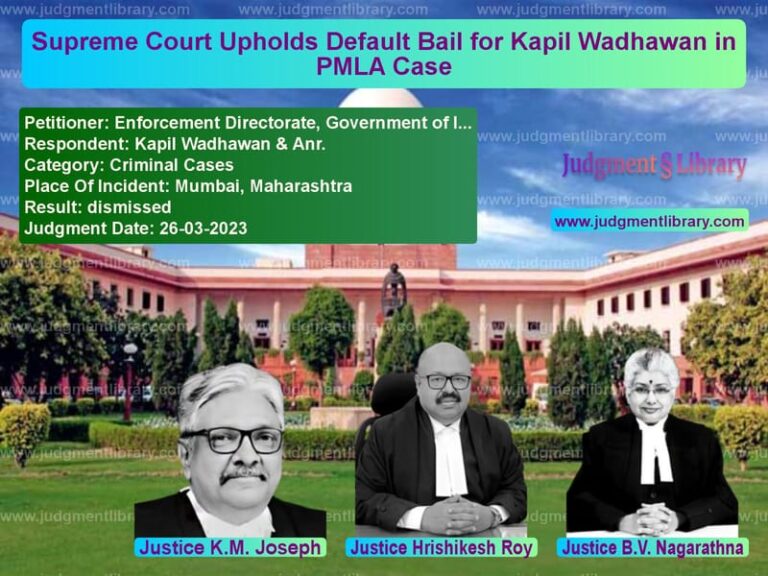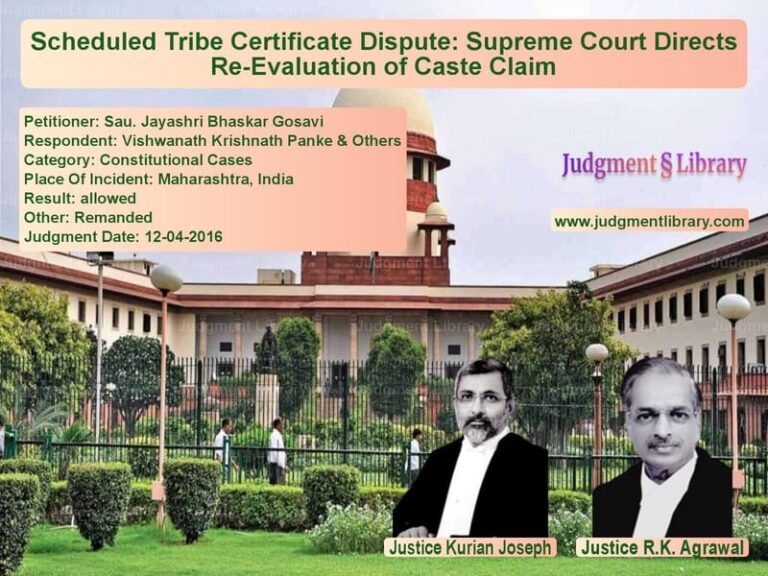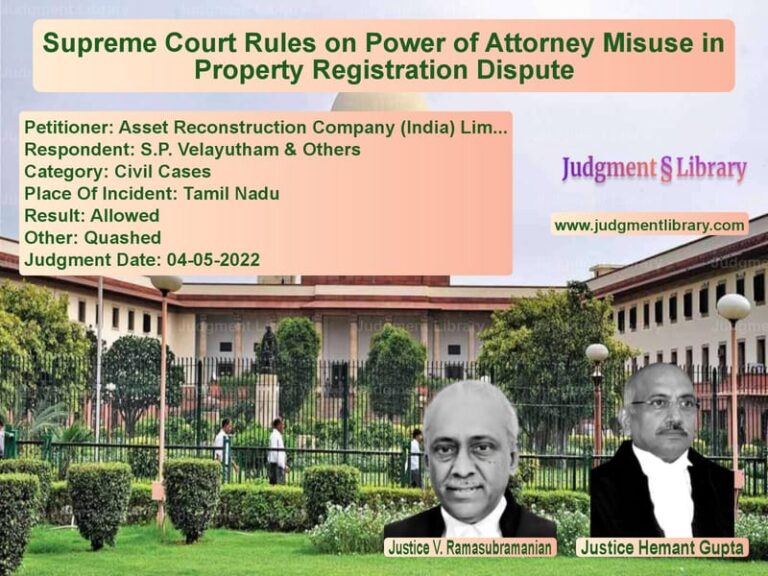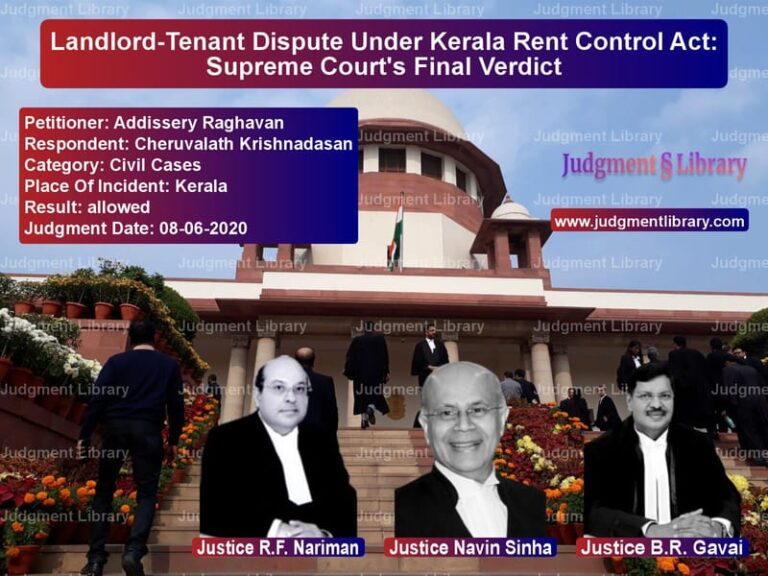Property Tax Assessment and Limitation Period: Municipal Corporation of Delhi vs. Dharma Properties Pvt. Ltd.
The case of Municipal Corporation of Delhi vs. Dharma Properties Pvt. Ltd. revolves around the issue of whether a notice for enhancing the rateable value of a property under the Delhi Municipal Corporation Act, 1957 was served within the prescribed limitation period. The Supreme Court had to determine if the assessment order passed by the Corporation was valid, considering that the notice was received by the respondent after the financial year had ended.
The dispute arose when the Municipal Corporation of Delhi (MCD) issued a notice under Section 126 of the Act proposing an enhancement in the rateable value of a property owned by Dharma Properties Pvt. Ltd. The notice was dated March 25, 1998 but was received by the respondent only on April 4, 1998. The assessment order finalizing the enhanced rateable value was passed on March 11, 2001, revising the assessments for the financial years 1997-98, 1998-99, and 2001-02. The respondent challenged the validity of the notice and the assessment order, leading to legal proceedings.
Background of the Case
The respondent’s property, located in Green Park Extension, New Delhi, had a previously assessed annual rateable value of Rs. 16,300. MCD proposed an enhancement of the rateable value to Rs. 16,30,370, effective from April 1, 1997. The respondent challenged the notice and the assessment order, arguing that the notice was received after the financial year had ended and was thus time-barred.
The Additional District Judge, Delhi, ruled in favor of the respondent, holding that the notice was invalid as it was not served within the prescribed period. The Delhi High Court upheld this decision. The MCD, aggrieved by the rulings, appealed to the Supreme Court.
Legal Issues
The Supreme Court identified the following key legal issues:
- Was the notice under Section 126 of the Delhi Municipal Corporation Act, 1957, served within the prescribed limitation period?
- Could an assessment order be passed based on a notice received after the financial year had ended?
- Was the enhancement of rateable value justified for the subsequent years?
- Could the MCD use the same notice to determine rateable value for future financial years?
Arguments by the Appellant (Municipal Corporation of Delhi)
The MCD presented the following arguments:
- The notice was issued on March 25, 1998, within the financial year, and dispatched under registered post on March 27, 1998.
- Under Section 444 of the Delhi Municipal Corporation Act, sending a notice via registered post constitutes service.
- Even if the notice was received after the financial year, the assessment was completed within the three-year period specified under Section 126(4).
- The assessment order was valid for the financial years 1998-99 and 2001-02.
Arguments by the Respondent (Dharma Properties Pvt. Ltd.)
The respondent countered with the following arguments:
- The notice had to be served before March 31, 1998 to be valid for the financial year 1997-98.
- The notice was received only on April 4, 1998, making it time-barred.
- An invalid notice for the financial year 1997-98 could not be used for assessments in subsequent years.
- The assessment order should be quashed as it was based on a procedurally defective notice.
Observations of the Supreme Court
The Supreme Court carefully analyzed the provisions of the Delhi Municipal Corporation Act, 1957, particularly Sections 126 and 444. The Court observed:
‘A notice under Section 126 of the Act is the starting point of the assessment process. If the notice itself is invalid due to late service, the assessment order based on it cannot stand.’
The Court further held:
‘The phrase ‘giving notice’ implies not merely dispatching but actual receipt within the relevant time frame.’
The Court referenced earlier judgments, including K. Narasimhiah v. H.C. Singri Gowda and Banarsi Debi v. Income Tax Officer, which established that mere dispatch of a notice does not constitute service. The Court reiterated that a notice must be received by the taxpayer before the deadline to be valid.
Final Judgment
The Supreme Court partly allowed the appeal and ruled:
- The notice was invalid for the financial year 1997-98 as it was received after March 31, 1998.
- The assessment order for 1997-98 was quashed.
- However, the assessment order for subsequent financial years (1998-99 and 2001-02) was upheld since the notice had been received before those years commenced.
- The MCD was directed to issue fresh notices in accordance with legal requirements before making future assessments.
Impact of the Judgment
This ruling has significant implications for property tax assessments:
- It clarifies that tax notices must be received within the prescribed period to be valid.
- It reaffirms that procedural lapses in serving notices can render tax assessments invalid.
- It protects property owners from retrospective tax demands based on defective notices.
- It provides guidance to municipal corporations on following due process in tax assessments.
Conclusion
The Supreme Court’s judgment in Municipal Corporation of Delhi vs. Dharma Properties Pvt. Ltd. reinforces the importance of procedural compliance in tax matters. By ruling that notices must be served within the prescribed period, the Court ensures that taxpayers are given a fair opportunity to respond. This judgment serves as a crucial precedent for municipal tax authorities and property owners, emphasizing the need for transparency and adherence to statutory timelines in tax assessments.
Don’t miss out on the full details! Download the complete judgment in PDF format below and gain valuable insights instantly!
Download Judgment: Municipal Corporatio vs Dharma Properties Pv Supreme Court of India Judgment Dated 15-09-2017.pdf
Direct Downlaod Judgment: Direct downlaod this Judgment
See all petitions in Tax Refund Disputes
See all petitions in Income Tax Disputes
See all petitions in Banking Regulations
See all petitions in Judgment by A.K. Sikri
See all petitions in Judgment by Ashok Bhushan
See all petitions in partially allowed
See all petitions in Modified
See all petitions in supreme court of India judgments September 2017
See all petitions in 2017 judgments
See all posts in Taxation and Financial Cases Category
See all allowed petitions in Taxation and Financial Cases Category
See all Dismissed petitions in Taxation and Financial Cases Category
See all partially allowed petitions in Taxation and Financial Cases Category







